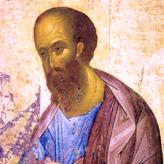by Fr. Patrick Henry Reardon

Orthodox Theology has only recently found its way into English, and much of that English is dominated by Latin terms: Trinity, Sacraments, Deification, Advent, Mission, Nativity, Presentation, Redemption, Salvation, and so on. Most Orthodox Christians appear to have no problem with this. Non-Latin English theological terms appear less frequently, Lent being the obvious exception.
Writing in English, consequently, I hope to be forgiven by other Orthodox Christians for using a uniquely English expression, “Atonement,” to designate what Christ the Redeemer accomplished on the earth. I am relying on this word, which is signified in its central, accented, and load-bearing syllable, to convey four ideas. Indeed, I am hard pressed to think of another English word that conveys all four of these ideas equally well:
First, “At-one-ment” conveys the force of the idea of Reconciliation (2 Corinthians 5:18-19; cf. Romans 5:10). On man’s part-not God’s-says Paul, there was an enmity God Himself removed by what He accomplished in Christ. This is one of the meanings of Atonement:
“the Redemption which is in Christ Jesus”” (Romans 3:24).
Second, the word conveys our experience of being “in Christ” and “with Christ.” These analogous “prepositions of place” have long served to designate the union we have with Christ by his gracious love. “Atonement” expresses this union perfectly: We are at-one with Christ.
Third, “Atonement” expresses the goal of Redemption, which is union of man with God. Orthodox Soteriology should not start—as Saint Anselm did—with fallen man. It should commence, rather, with man completely restored in Christ. The word “atonement” means the goal, the telos or skops of all God’s activity in this world: man’s participation in the life of God.
(Anselm, let me mention in passing, did not know or use the word “Atonement.” He was an Italian who wrote exclusively in Latin. Those who speak of “Anselm’s theory of the Atonement,” then, can be safely dismissed.)
This is a very traditional idea in the Church. Already in the second century, Irenaeus of Lyons, the direct and almost-immediate heir of the Pauline and Johannine traditions of Asia, wrote of
“our Lord Jesus Christ, who by his supreme love became what we are, in order to bring us to what he himself is.”
More boldly Athanasius of Alexandria, two centuries later, wrote of God’s Son,
“he became man that we might become God.”
The tradition represented by Athanasius regarded the divinizing of man as the purpose of the Incarnation. Variations of theopoiesis appear repeatedly among the Alexandrians.
Slightly later in the fourth century St. Gregory Nazianzen invented a shorter expression, theosis, which became more common among the Greek Fathers to designate the believer’s incorporation into the life of God. This persuasion—and even this mode of expressing it—became standard during the period of the great Christological controversies.
Largely through the Latin translations of St. John Damascene and Pseudo-Dionysius in the Middle Ages, the equivalent Latin word, deificatio, gradually became acceptable in the West.
I use the word “Atonement,” then, to include Redemption’s full effect in the human being—that is, deification, man’s transfiguration in the glory of Christ. Among properly English words I cannot think of one that better expresses this theandric (God-man) quality of what Christ accomplished.
Fourth, “Atonement” enjoys the added merit of expressing the cosmology of Redemption, the reconciliation of the whole universe, its “re-heading” (anakephalaiosis, recapitulatio) in Christ. “Atonement” conveys everything St. Paul meant when he wrote that it pleased the Father, through Christ,
“to reconcile all things (apokatallaxsai ta panta) to Himself, through him, whether things on earth or things in heaven, having made peace through the blood of his cross.”
Christ’s reconciliation embraces “all things”—ta panta. The glory of the transfigured Christ transforms the whole universe; heaven and earth are full of his glory.
For this reason an adequate theology of the Atonement should treat of several subjects not commonly associated with the Atonement, such as history, philosophy, literature, and psychology. I believe this disassociation is a serious defect; the exclusion of these subjects narrows the soteriological idea to a mere fraction of its meaning. All of these expressions of human consciousness and creativity give voice to man’s place in the world, his vocation to be the one locus where the Universe tries to makes sense of itself.
